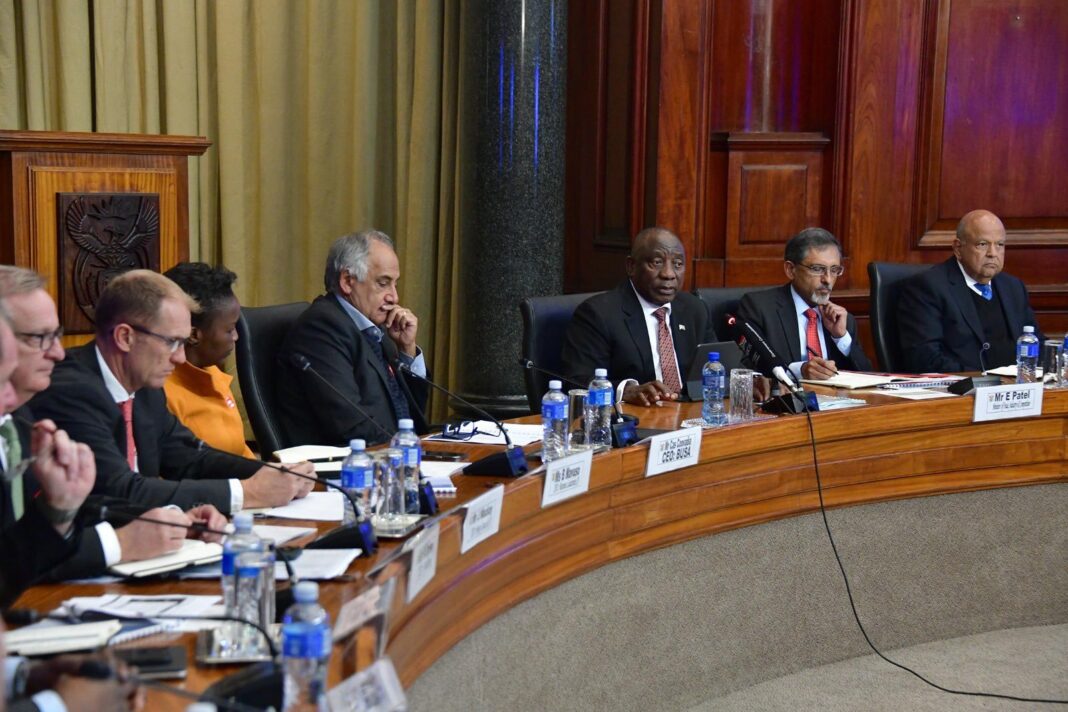Johnathan Paoli
THE South African business fraternity, Business Unity SA (BUSA) and Business for South Africa (B4SA) have said that it will consider taking legal action against President Cyril Ramaphosa and his government following their intention to forge ahead with the highly contested National Health Insurance (NHI) Bill.
BUSA urged the president to send the controversial NHI bill back to Parliament for re-evaluation and amendments, and said that in its current form it could prove disastrous for the country’s health system.
The NHI Bill was passed by the National Council of Provinces late last year, and subsequently sent on to the president to be signed into law, with the government standing firm in its support for the bill, and rejecting warnings that it could potentially undermine universal healthcare instead of advancing its progress.
BUSA CEO Cas Coovadia said that while the organisation did not stand in opposition to equal access to quality universal healthcare, the bill in its current form could result in a mass exodus of doctors from the country and that interest groups from the private sector were likely to pursue legal action against the government.
“What the country needs is an NHI underpinned by the Constitution, and which is affordable and implementable. This Bill does not meet these criteria and is not ready to be signed into law,” Coovadia said.
Coovadia said the bill in its current iteration could materially delay access to universal health coverage, lead to disinvestment in the healthcare sector, further damage the country’s already fragile economy and create significant risks for SA in terms of the availability, quality, management and governance of healthcare.
The CEO said that while BUSA was aware of the country being in pre-election mode and that the adoption of the NHI bill could be seen as a cornerstone of the government’s policy platform and election campaign; the weaknesses and the material negative implications of the bill, would have devastating consequences for the country and her people.
The key procedural and substantive constitutional issues raised by the two organisations include parliament’s socioeconomic-impact assessment process being inadequate, that the National Economic Development and Labour Council process in respect of the bill was not followed through, that public participation inputs were not properly considered and that multiple constructive inputs from business and other stakeholders were ignored.
In addition, BUSA said that parliament’s portfolio committee on health ignored an opinion by Parliamentary Legal Services, which highlighted several unconstitutional areas within the prospective legislation; with the process conducted by the NCOP Select Committee on Health and Social Services being “rushed, inadequate in terms of its mandate and failed to properly deal with reports submitted by the provinces”.
Central to the objections was section 33 of the bill which BUSA said was unconstitutional in giving the Health Minister “unfettered power” to determine the restricted role for medical schemes, especially as this power was unnecessary for achieving the policy objectives outlined in the legislation.
The amendments proposed by the organisations seek to allow a role for medical schemes to be determined in a consultative process, in measured phases in a manner that was consistent with the policy objectives, and that the procedures for accessing healthcare and appealing treatment denied by the NHI, could potentially hinder or violate the right to access health services, making them unconstitutional.
The organisations further outlined several inconsistent sections of the bill, which stood in contradiction with the Competition Act and the Protection of Personal Information Act, and that separation of powers concerns were raised by the NHI awarding the Health minister judicial powers.
BUSA alleged that the potential consequences of implementation of the NHI bill could culminate in a loss of approximately R196-billion in funding from Provincial Equitable Share allocations and Conditional Grants.
However, Ramaphosa did commit in November last year to test the constitutionality of the bill, following a previous petition by BUSA over the unconstitutional nature of the bill, with presidency spokesperson Vincent Magwenya saying that the president would not simply sign the controversial legislation into law.
“The passing of the Bill doesn’t necessarily mark the conclusion of the process. The president does not, each time he receives a Bill, just sign it as a given. If he so desires, he can open another round of consultation to satisfy himself that what he will sign will not be subjected to endless litigation,” Magwenya said.
However, on the other side of the coin, many have praised the finalisation and adoption of the bill, following several delays, with Cosatu saying that it remained a victory in light of government policy and market failure which have left most South Africans, in particular the working class, severely lacking access to quality and affordable health care.
Cosatu acting spokesperson Matthew Parks said that the government needed to move with haste to resource and build a quality NHI that will guarantee quality, accessible and affordable universal health coverage for all South Africans.
“We cannot afford to be a nation that 29 years after 1994 still grapples with the blatantly unequal and racially skewed distribution of resources and access to health care. The right to life and access to health care are inalienable constitutional rights. It is time that all South Africans are afforded these rights,” Parks said.
INSIDE POLITICS

